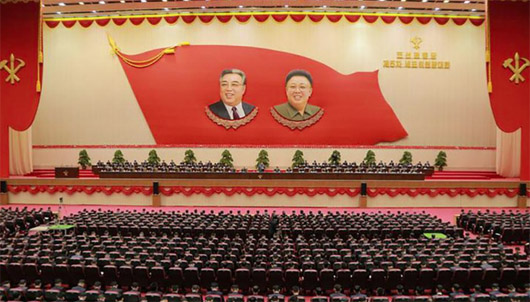Special to WorldTribune.com
UNITED NATIONS — Though out of the limelight for nearly a year, North Korea’s quiet and covert push for intercontinental ballistic missile capability along with the communist regime’s continuing political crackdown on its own population has not abated.
While tough American diplomacy has pressured Kim Jong-Un’s regime from firing long-range missiles and testing its prohibited nuclear arsenal, the reality remains that the Democratic People’s Republic of Korea’s programs have not disappeared, but put on pause.

Now comes a stinging rebuke to North Korea by the UN’s powerful but often overlooked #1718 Sanctions Committee. Germany’s Ambassador Christoph Heusgen and the representatives of Britain and France stated, “Since May, the DPRK has conducted 12 sets of launches of ballistic missiles, including what appears to be a medium-range missile launched from underwater.” Adding, “We strongly condemn these provocative actions, which undermine regional security and stability.”
The Committee urged, “We urge the DPRK to engage in good faith in meaningful negotiations with the United States and to take concrete steps with a view to abandoning all weapons of mass destruction and ballistic missile programs.”
Recall that after a dangerous military showdown with the United States in 2017, the Trump Administration convinced the Pyongyang leadership to take the diplomatic path to avoid almost certain confrontation. Two subsequent Summits in Singapore and Hanoi stopped the clock ticking towards war but failed to solve the decades old problem of North Korea’s nuclear proliferation.
Again the UN’s #1718 Committee warned bluntly, “We reiterate that the current humanitarian situation in the DPRK is the result of the misallocation of resources…We call on the DPRK to address food shortages by prioritizing the well-being of its own people over the development of its WMD and ballistic missile programs.”
Absolutely correct. As this column has often stated, North Korea prioritizes neutrons over nutrition for its own population.
And what of the political and humanitarian situation? The UN’s Third Committee (Political) passed its annual resolution outlining the dire human rights conditions in the quaintly titled Democratic People’s Republic of Korea.
The resolution was co-sponsored by 45 countries including the U.S., Australia, Canada, France, Germany and Japan.
Shamefully for the first time since 2008, the South Korean government chose not to co-sponsor the resolution which deals with the harsh humanitarian situation facing fellow Koreans living north of the DMZ.
The document didn’t mince words; it noted UN findings that 11 million people in the DPRK are estimated to be undernourished, “one third of children 6 to 23 months of age do not receive a minimum acceptable diet, 1 in 5 children suffer from stunting (chronic malnutrition), around 9 million people are estimated to have limited access to quality health services.”
That’s just under half of North Korea’s entire population!
The resolution starkly condemned the DPRK for “diverting its resources into pursuing nuclear weapons and ballistic missiles over the welfare of its people.”
Specifically the resolution “Condemns the long-standing and ongoing systematic, widespread and gross violations of human rights in and by the Democratic People’s Republic of Korea, including those that may amount to crimes against humanity…Torture and other cruel, inhuman or degrading treatment or punishment, including inhuman conditions of detention; rape; public executions; extrajudicial and arbitrary detention; the absence of due process and the rule of law.”
The document underlines “arbitrary executions; the imposition of the death penalty for political and religious reasons; collective punishments extending up to three generations; and the extensive use of forced labor; The existence of an extensive system of political prison camps, where a vast number of persons are deprived of their liberty and subjected to deplorable conditions.”
The resolution equally underscores deep concern over “Discrimination based on the songbun system, which classifies people on the basis of State-assigned social class and birth and also includes consideration of political opinions and religion.”
Where do we go from here?
In December the U.S. and European states plan to sponsor a Security Council debate on North Korean human rights. China predictably is trying to sidetrack the action. At the same time Kim Jung-Un has pushed for new negotiations with the USA in a bid to end stifling economic sanctions and strike a nuclear deal. The DPRK has set an improbable December deadline for a resolution of the crisis.
Washington should pursue a dual track deal with Pyongyang; press for human rights transparency and nuclear non-proliferation. Indeed any agreement must include a North Korean non-aggression pact and a long awaited peace treaty.
John J. Metzler is a United Nations correspondent covering diplomatic and defense issues. He is the author of Divided Dynamism the Diplomacy of Separated Nations: Germany, Korea, China (2014). [See pre-2011 Archives]

 By
By